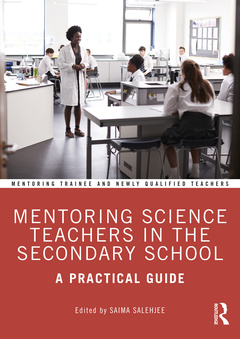Mentoring Science Teachers in the Secondary School A Practical Guide Mentoring Trainee and Early Career Teachers Series
Coordonnateur : Salehjee Saima

This practical guide helps mentors of new science teachers in both developing their own mentoring skills and providing the essential guidance their trainees need as they navigate the rollercoaster of the first years in the classroom. Offering tried-and-tested strategies based on the best research, it covers the knowledge, skills and understanding every mentor needs and offers practical tools such as lesson plans and feedback guides, observation sheets and examples of dialogue with trainees.
Together with analytical tools for self-evaluation, this book is a vital source of support and inspiration for all those involved in developing the next generation of outstanding science teachers. Key topics explained include:
? Roles and responsibilities of mentors
? Developing a mentor?mentee relationship
? Guiding beginning science teachers through the lesson planning, teaching and self-evaluation processes
? Observations and pre- and post-lesson discussions and regular mentoring meetings
? Supporting beginning teachers to enhance scientific knowledge and effective pedagogical practices
? Building confidence among beginning teachers to cope with pupils? contingent questions and assess scientific knowledge and skills
? Supporting beginning teachers? planning and teaching to enhance scientific literacy and inquiry among pupils
? Developing autonomous science teachers with an attitude to promote the learning of science for all the learners
Filled with tried-and-tested strategies based on the latest research, Mentoring Science Teachers in the Secondary School is a vital guide for mentors of science teachers, both trainee and newly qualified, with ready-to-use strategies that support and inspire both mentors and beginning teachers alike.
Introduction: A Practical Guide to Mentoring in Science Education SECTION 1 Foundations of Mentoring 1 Models of mentoring2 About you as a mentor 3 Beginning science teachers’ expectations of their mentors 4 Accountabilities of a reflective mentor 5 Developing a mentor-mentee relationshipSECTION 2 Basic Mentoring Practice6 Supporting beginning teachers with lesson planning 7 Supporting beginning science teachers to teach and evaluate their lessons 8 Pre-lesson discussion, lesson observation and post-lesson discussions in mentoring beginning science teachers 9 Holding weekly mentoring meetings SECTION 3 Extending Basic Mentoring Practices 10 Supporting beginning teachers to develop pedagogical content knowledge11 Supporting beginning teachers to cope with contingencies 12 Supporting beginning teachers to develop their ability to assess pupils 13 Supporting beginning teachers to link learning, memory and inquiry 14 Supporting a beginning teacher to apply features of the nature of science in their lessons 15 Supporting beginning teachers in embedding scientific literacy 16 Mentoring beginning teachers in implementing Process-Oriented Guided Inquiry Learning (POGIL): An example of an inquiry-based pedagogical approach of teaching science SECTION 4 Moving Beyond 17 Supporting a beginning teacher to become autonomous 18 Supporting a beginning teacher to implement extension and enrichment Chapter 19 Supporting beginning teachers to work with pupils with special educational needs and disability (SEND) Chapter 20 To conclude
Saima Salehjee is a Lecturer in Chemistry Education at the University of Strathclyde, Glasgow. She is responsible for teaching and research work with particular emphasis on STEM education.
Date de parution : 12-2020
17.4x24.6 cm
Date de parution : 12-2020
17.4x24.6 cm
Thème de Mentoring Science Teachers in the Secondary School :
Mots-clés :
Beginning Teacher; mentoring training teachers; Secondary Chemistry Teaching; mentoring trainee teachers; Secondary Biology Teaching; mentoring student teachers; Beginning Science Teacher; teacher training mentor; ITT; mentoring; School Based Teacher Training; NQT; Mentor Mentee Relationship; Professional Development; school-based teacher training; Post-lesson Discussion; PGCE mentor; Learning Cycle; Secondary Science; Beginning Teacher Development; science education; Learning Progression Approach; trainee teacher; ITE Programme; school based training; Pre-lesson Discussions; PGCE science; Mentoring Meeting; books for science teachers; Lesson Debriefs; NoS Element; Effective Mentor; seconday physics teaching; Scientific Skills Development; Observation sheets; Mentoring Approach; Mentoring skills; Participatory Appropriation; Tried-and-tested strategies; Mentoring Style; Secondary school; Mentoring Practices; Science teachers; POGIL; PCK



